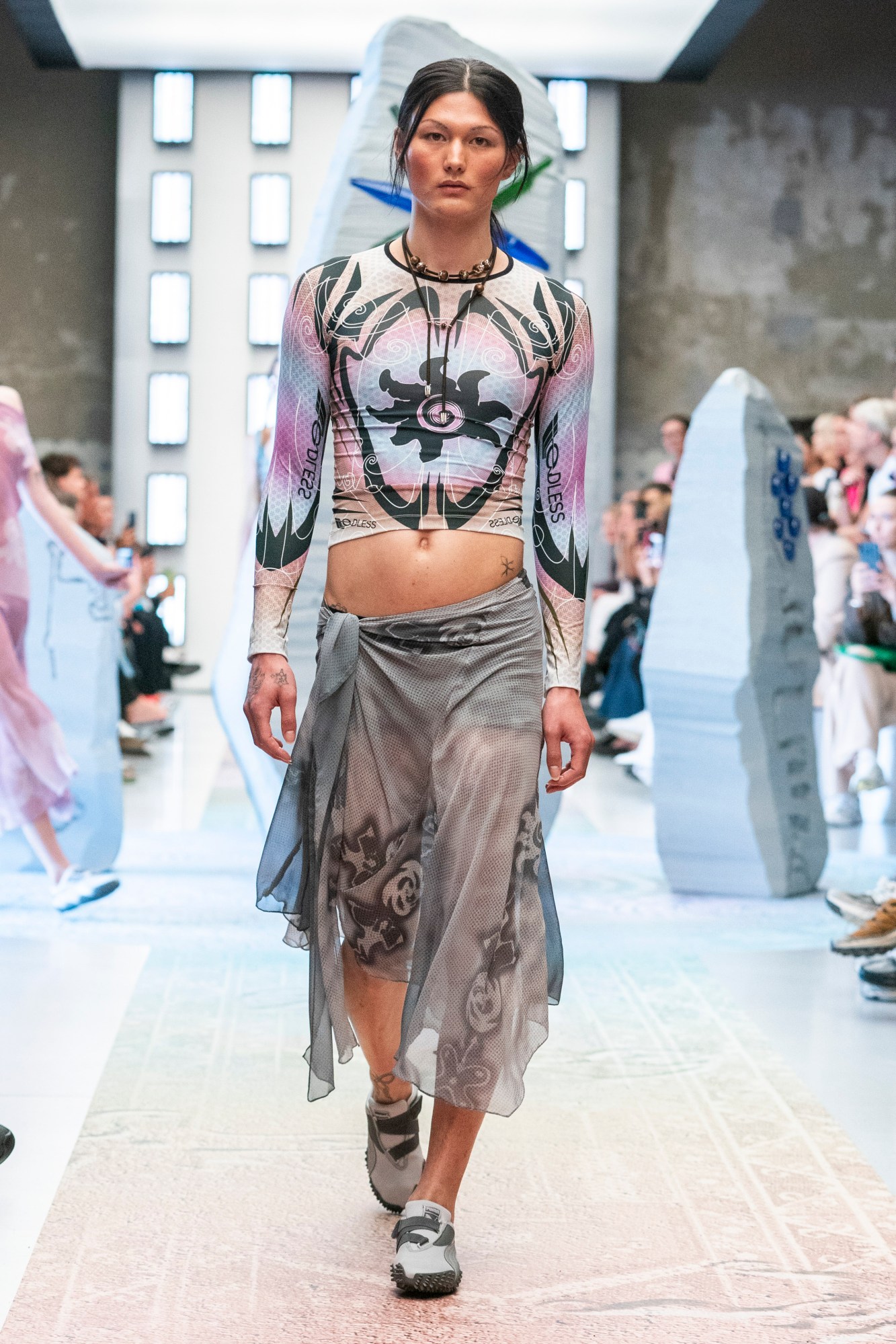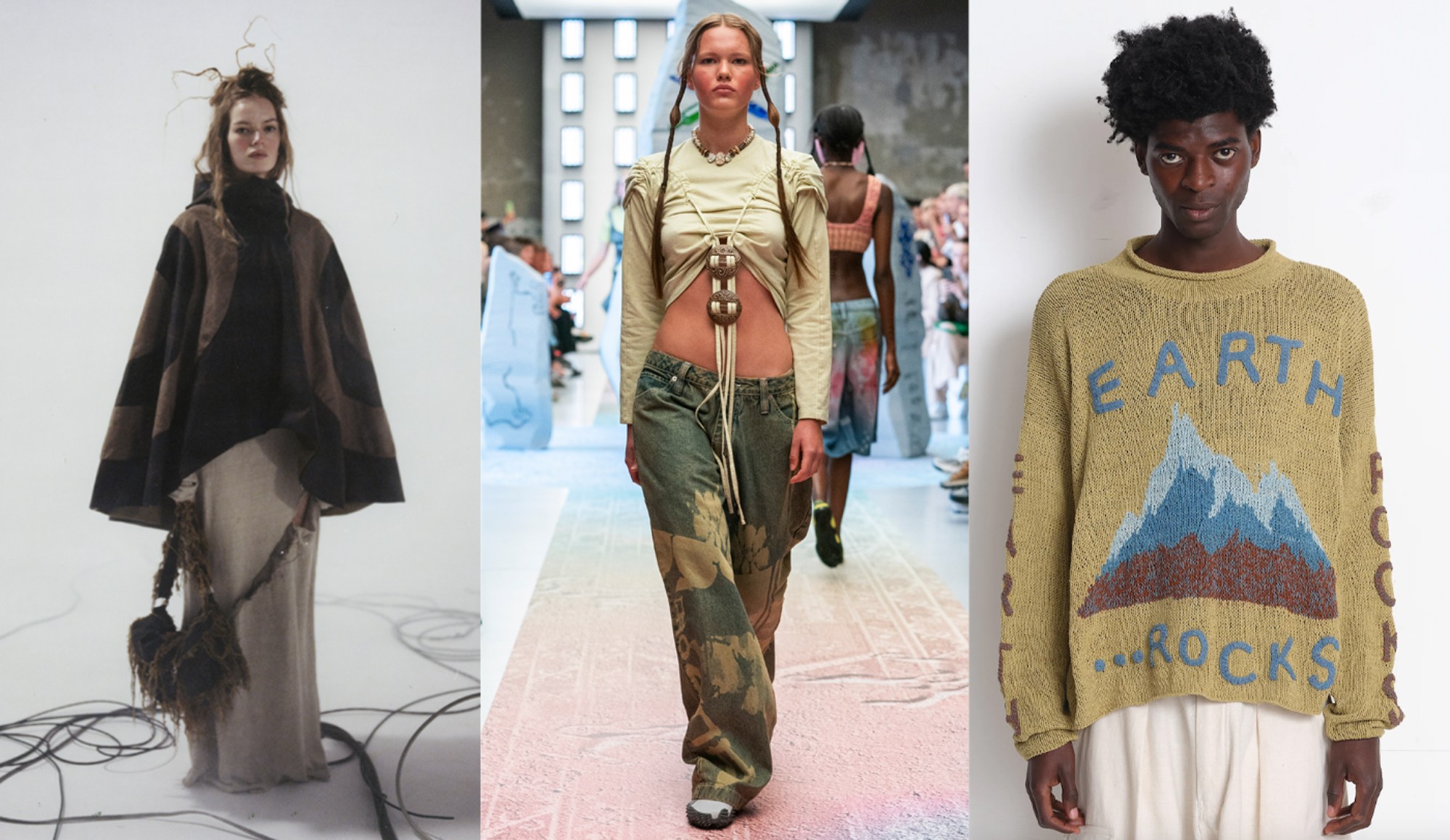Whether casting incantations, reaching for tarot cards or celebrating the summer solstice, more and more people are turning to neo-Paganism, with the witchy movement bewitching fashion too. On TikTok, the girlies are either obsessed with Wednesday Addams’ wardrobe or going full whimsigoth — equal parts whimsical and gothic, with heavy references to 90s supernatural TV shows and movies like Sabrina The Teenage Witch and The Craft. On the runway, stone circles and mysterious cave carvings have inspired runic knits, like the ones in Paolina Russo’s recent show during Copenhagen Fashion Week. Even the Gaelic festival Lughnasadh made its fashion week appearance, courtesy of Simone Rocha. As the industry adopts ancestral traditions, feasts and beliefs, it prompts the question: is fashion falling under neo-Paganism’s spell?
First, let’s clarify what neo-Paganism is exactly. ‘Pagan’ was originally coined by 4th-century Christians to refer to anyone who didn’t follow the Abrahamic religions. It remained a fairly derogatory label until 20th-century pagans (or neo-Pagans) reclaimed it as an umbrella term for several of their practices, traditions and paths. Today, a growing number of people (74,000 of them in England and Wales) self-identify as such – Seren Gwanwyn being one of them. “I was born on Anglesey, in the evening and by an outside fire. And it was one of those proper earthy upbringings,” she laughs. Seren uses her Instagram account to highlight one of neo-Paganism’s universal tenets: “respect and admiration for the natural world.”
“Lots of things we see today – lightning strikes, rainbows, the rise and fall of the sun – we can explain through modern science,” she explains, “but to our ancestors, it was magic or divine. Nature was an incredibly powerful part of everyday life, and it’s important to appreciate that today.” Related to that is neo-Paganism’s polyethism. Instead of worshipping one male god, the practice usually recognises several divine beings (either as natural elements or gods and goddesses) and often promotes a particular worship of divine femininity. She’s mother nature, after all.
Historically, fashion has done the exact opposite. Since its conception, the garment industry has relied on exploiting both natural resources and female labour. So, it makes sense that folkloric and neo-Pagan aesthetics have served as an inspiration, or even a symbol, to designers who are trying to challenge that system. Take STORY mfg. for example, a slow clothing brand creating arts-and-craft pieces using natural dyeing techniques and a zero-waste approach. Their entire current collection is giving Willow from Buffy the Vampire Slayer, basically venturing into #whimsigoth before TikTok coined the term.
The 10 years since STORY mfg.’s conception have seen a growing demand for sustainable, inclusive and ethical practices. Fashion that used to be reserved for Crunchy Granola People is now going viral. To illustrate: Chopova Lowena’s pleated skirts have earned cult status. That’s largely thanks to their style (a nod to Scottish kilts and Bulgarian folk costumes), but also thanks to the brand’s use of recycled fabrics and support of female artisans. Meanwhile, Copenhagen-based label Solitude Studios has generated a buzz with its elvish seaweed bags and Middle Earth-appropriate shirts. The brand’s creations take their cue from nature (albeit with a futuristic twist) and are made with experimentally-manipulated natural fibres. Their AW23 collection is titled WoodWideWeb. “Here, we draw the parallels between fungal communication systems and the internet,” explains Jonas Sayed Gammal Bruun, the brand’s co-founder. It all feels very Technopagan.
And then, there’s the ancestral vibe of Zalando Visionary Award-winners Paolina Russo and Lucile Guilmard. The brand’s folkloric style is intrinsically knitted together with its focus on conscious craft. Its speciality is knitwear, after all. “Knitwear is an ancient craft that has been passed down from generation to generation,” Paolina notes. Besides wool, clothes are mainly made from organic cotton and consciously lack hardware. “It’s this idea of the full circle,” Lucile explains. “We’re working with fibres that come from the earth, respect the body of the wearer, and will eventually be returned to the earth.”
In their SS24 collection, Paolina and Lucile explored the mystical Stone circles of Avebury and the carvings in Royston Cave – connecting them to the chalk artworks that so many of us drew on the pavements as kids. “We were inspired by the collective consciousness, how we’re practising the same rituals now as we did thousands of years ago,” says Paolina. And so, models strutted down the runway in folky dresses, knits and denim, covered in pastel-coloured, rune-like symbols. One ensemble, featuring a gathered crop top and two carved wooden toggles, would fit as nicely in a book of Norse mythology as it did at CPHFW.

On that note, Paolina Russo’s collections have always been home to a scope of female warriors – many of them inspired by games like The Legend of Zelda, which was itself based on mythology (Celtic, Norse, Greek and beyond) that is also present in many neo-Pagan traditions. Here, femininity is just as powerful and revered as masculinity – perhaps even more so. As a woman living in 2023, it’s easy to see the appeal in that facet of neo-Paganism, whether as a spiritual path or a fashion muse.
More and more Millennials and Gen Z-ers are going neo-Pagan. And many are sharing their beliefs on social media which, according to Seren, only helps make the practice more accessible: “Many young people are discovering that you don’t have to follow a constricted religious path anymore. There are other ways to learn, to connect with your roots and your culture.” Of course, fashion is picking up on some of that. But being sartorially inspired by the practice doesn’t automatically make you a neo-Pagan (although they all admit to being spiritual, neither the founders Paolina Russo nor those of Solitude Studios are).
In times characterised by eco-anxiety, the regression of women’s rights and attempting to live in a cost-of-living crisis, neo-Paganism’s tenets – a reverence for nature, the re-examination of traditional gender roles and a general sense of escapism – just hit right. Channel them via your crystals, ceremonies or your wardrobe choices. Simply pick your potion… erm, poison.


